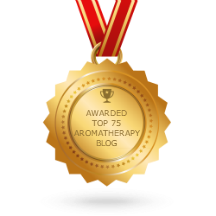 I love it when something I've never quite been able to wrap my brain around suddenly makes sense. The "Aha Moment"
I love it when something I've never quite been able to wrap my brain around suddenly makes sense. The "Aha Moment"For years I just rather assumed that Cistus Essential Oil was distilled from the leaves of the RockRose plant (cistus ladinifer). and that Labdanum absolute was solvent extracted from the same botanical. Or, maybe that cistus essential oil was distilled from the resin of the above named plant, and the absolute from the same substance.
Until I realized that my producer offered not only Cistus essential oil AND Labdanum Absolute but also a Cistus Absolute. Ooooooooooops. That totally confused me.
Obviously Cistus Absolute and Labdanum absolute weren't the same thing (since there is quite a difference in price.) but??? confusion reigned supreme.
Finally, after much material being sent me, and many questions back and forth by email, I finally wrapped my brain around it.
The shrub commonly known as Rock Rose (but known as "Christ's Tears" in Andalusia because of it's five petalled flower, with deep purple spots on each petal, near the center of the blossom) produces a thick, resinous exhudate from the leaves (actually from the whole plant, but mostly from the leaves.) This aromatic resin (called Labdanum!) protects the plant from evaporation.
In ancient times, when goats fed on the leaves of the Cistus shrub, the resin stuck to their beards and was combed out. (Surely they don't still collect it that way?)


Cistus Essential Oil is produced by steam distillation of the leaves of the shrub. That makes sense. Yield, by the way, is quite low, normally less than 1% of the weight of the botanical.
but the resin? the absolute? If the essential oil is distilled from the leaves, where does the resin come from? and the absolute? Cistus Absolute is extracted from the leaves. Okay...what is the difference between Cistus Absolute and Labdanum Absolute. Still scratching my head here.
The leaves of the plant (obviously not the same leaves that have been steam distilled to produce the oil!) are soaked in warm carbonated water. Since carbonated water is fairly acidic, the acid solution causes the raw resinoid to separate from the leaves, so that it may be collected from the water bath.
This raw resinoid is then washed with alcohol and concentrated to form what is known as Labdanum Resin. (Wonderfully aromatic stuff, almost solid, and totally impossible to dissolve in carrier oil. I know. We tried.)
This resin is far more concentrated than the essential oil derived from the leaves.
The resin is further processed (washed with Ethanol) to produce the Absolute, which, fortunately for us, is soluble in carrier oil. AH... Cistus is from the leaves, which produce *some* resin. Labdanum is the resin itself, and Labdanum Absolute is extracted from the resin itself. Which is why it is so much more aromatic, more intense.
There may be some other natural botanical which gives the amber note found in the various cistus products, but I've not encountered any.
Cistus Essential Oil is sweetly balsamic, with amber notes. Our Labdanum absolute, on the other hand, is deeper, darker, almost animalic. It would be superb in any leather blend, add depth to amber blends, and, of course, is the basic necessity for any chypre based accords for the perfumers.
I am so glad I finally got that one straight!


2 comments:
Followup - We just received a wee sample of the Cistus Absolute. Solvent extracted from the leaves, rather than the resin. As expected, it was much lighter in aroma than the Labdanum Absolute or Resin, even lighter than our "open fire" distilled Cistus Essential Oil.
Very nice! I never thought that any form of Cistus could be a top note, but this is either a top or at the very least a high heart note.
It has the balsamic resinous note of the other Cistus oils and absolutes, but much lighter. One of my staff said it reminded her of a Christmas tree.
Interesting! Am I going to bring some in? I doubt it, but it was fun to experience it.
Thank you, thank you, thank you for clarifying this for me! I am a perfumer in training and my brain just couldn't understand the difference even though my nose definitely smelled it! :)
Post a Comment